Related Research Articles

A roommate is a person with whom one shares a living facility such as a room or dormitory except when being family or romantically involved. Similar terms include dorm-mate, suite-mate, housemate, or flatmate. Flatmate is the term most commonly used in New Zealand, when referring to the rental of an unshared room within any type of dwelling. Another similar term is sharemate. A sharehome is a model of household in which a group of usually unrelated people reside together, including lease-by-room arrangements. The term generally applies to people living together in rental properties rather than in properties in which any resident is an owner occupier. In the United Kingdom, the term "roommate" means a person sharing the same bedroom; in the United States and Canada, "roommate" and "housemate" are used interchangeably regardless of whether a bedroom is shared, although at US universities having a roommate commonly implies sharing a bedroom. This article uses the term "roommate" in the US sense of a person one shares a residence with who is not a relative or significant other. The informal term for roommate is roomie, which is commonly used by university students and members of the younger generation.

Bethany Lutheran College (BLC) is a private Christian liberal arts college in Mankato, Minnesota. Founded in 1927, BLC is operated by the Evangelical Lutheran Synod. The campus overlooks the Minnesota River valley in a community of 53,000.

Homeless shelters are a type of service that provides temporary residence for homeless individuals and families. Shelters exist to provide residents with safety and protection from exposure to the weather while simultaneously reducing the environmental impact on the community.

Mattapan is a neighborhood in Boston, Massachusetts, United States. Mattapan is the original Native American name for the Dorchester area, possibly meaning "a place to sit." At the 2010 census, it had a population of 36,480, with the majority of its population immigrants.
Supportive housing is a combination of housing and services intended as a cost-effective way to help people live more stable, productive lives, and is an active "community services and funding" stream across the United States. It was developed by different professional academics and US governmental departments that supported housing. Supportive housing is widely believed to work well for those who face the most complex challenges—individuals and families confronted with homelessness and who also have very low incomes and/or serious, persistent issues that may include substance use disorders, mental health, HIV/AIDS, chronic illness, diverse disabilities or other serious challenges to stable housing.
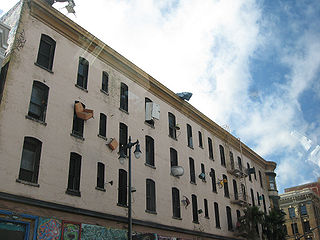
Single-room occupancy (SRO) is a type of low-cost housing typically aimed at residents with low or minimal incomes, or single adults who like a minimalist lifestyle, who rent small, furnished single rooms with a bed, chair, and sometimes a small desk. SRO units are rented out as permanent residence and/or primary residence to individuals, within a multi-tenant building where tenants share a kitchen, toilets or bathrooms. SRO units range from 7 to 13 square metres. In some instances, contemporary units may have a small refrigerator, microwave, or sink.

Affordable housing is housing which is deemed affordable to those with a household income at or below the median, as rated by the national government or a local government by a recognized housing affordability index. Most of the literature on affordable housing refers to mortgages and a number of forms that exist along a continuum – from emergency homeless shelters, to transitional housing, to non-market rental, to formal and informal rental, indigenous housing, and ending with affordable home ownership. Demand for affordable housing is generally associated with a decrease in housing affordability, such as rent increases, in addition to increased homelessness.

The McKinney–Vento Homeless Assistance Act of 1987 is a United States federal law that provides federal money for homeless shelter programs. It was the first significant federal legislative response to homelessness, and was passed by the 100th United States Congress and signed into law by President Ronald Reagan on July 22, 1987. The act has been reauthorized several times over the years.
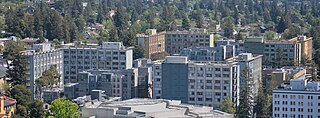
Housing at the University of California, Berkeley, includes student housing facilities run by the office of Residential and Student Service Programs (RSSP). Housing is also offered by off-campus entities such as fraternities and sororities and the Berkeley Student Cooperative (BSC).
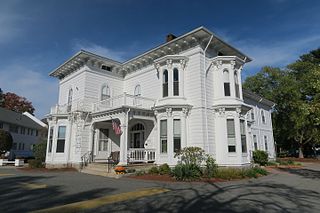
The Learning Center for the Deaf (TLC) is a Framingham, Massachusetts-based non-profit organization and school serving deaf and hard-of-hearing children and adults. The mission of The Learning Center for the Deaf is to ensure that all deaf and hard of hearing children and adults thrive by having the knowledge, opportunity and power to design the future of their choice.

So Others Might Eat (SOME) is a nonprofit organization that provides services to assist those dealing with poverty and homelessness in Washington, D.C. The organization provides affordable housing, job training, counseling and other healthcare services, and daily needs such as food and clothing to the poor and homeless. It spends the largest portion of its annual budget on affordable housing, with a majority of its residents recovering from addiction. SOME describes its mission as helping "our vulnerable neighbors in Washington, DC, break the cycle of homelessness through our comprehensive and transformative services".

Lenox Hill Neighborhood House is a multi-service, community-based organization that serves people in need on the East Side of Manhattan and on Roosevelt Island. Founded in 1894 as a free kindergarten for the children of indigent immigrants and as one of the first settlement houses in the nation, Lenox Hill Neighborhood House is the oldest and largest provider of social, legal and educational services on Manhattan's Upper East Side. Each year, they assist thousands of individuals and families who range in age from 3 to 103, represent dozens of races, ethnicities and countries of origin and "live, work, go to school or access services" on the East Side from 14th Street to 143rd Street and on Roosevelt Island. Their clients include indigent families and the working poor who live in the East Side's housing projects and tenements or who travel to the Upper East Side to work in low-wage jobs such as cashiers, housekeepers, nannies and laborers; 10,000 seniors; and hundreds of mentally ill homeless and formerly homeless adults. They have five locations between 54th and 102nd Streets, offer programs at dozens of East Side locations; their headquarters is located on East 70th Street.
The Cathedral Shelter of Chicago was founded in 1915. It began as a storefront mission of the Episcopal Diocese of Chicago, attached to the former Cathedral of Sts. Peter and Paul, providing food and clothing to the poor and homeless. In 1920, they began offering substance abuse treatment. Under the leadership of Father David Gibson, an Episcopal priest, the shelter was of great importance during the Great Depression.
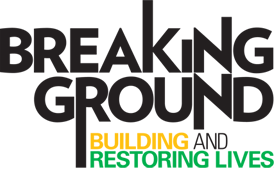
Breaking Ground, formerly Common Ground, is a nonprofit social services organization in New York City whose goal is to create high-quality permanent and transitional housing for the homeless. Its philosophy holds that supportive housing costs substantially less than homeless shelters — and many times less than jail cells or hospital rooms, and that people with psychiatric and other problems can better manage them once they are permanently housed and provided with services. Since its founding in 1990 by Rosanne Haggerty, the organization has created more than 5,000 units of housing for the homeless. "This is about creating a small town, rather than just a building," according to Haggerty. "It's about a real mixed society, working with many different people." Haggerty left the organization in 2011 to found Community Solutions, Inc. Brenda Rosen was promoted from Director, Housing Operations and Programs to Executive Director, and has led the organization since.
South Middlesex Opportunities Council, commonly referred to as SMOC, is one of the largest private, non-profit social services groups in Eastern Massachusetts. Operating in the Metrowest region of the state, the group provides homeless shelters, drug rehabilitation programs, family counseling handicapped transportation and numerous other social services. It was founded in 1966.
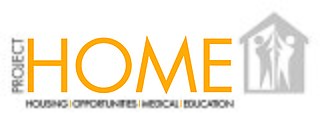
Project HOME is a nationally recognized 501(c)(3) non-profit organization that provides housing, opportunities for employment, medical care and education to homeless and low-income persons in Philadelphia, Pennsylvania.
Rapid Re-Housing is a relatively recent innovation in social policy that is an intervention designed to help those who are homeless. As described by the National Alliance to End Homelessness, Rapid Re-Housing is a subset of the Housing First approach to end homelessness. While many Housing First programs provide rental assistance, or help clients to access rent subsidies, Rapid Re-Housing programs always provide short-term rental assistance and services, with services ending once rental assistance terminates. As with the Housing First approach, the goals are to help people obtain housing quickly, increase self-sufficiency, and remain housed. The Core Components of rapid re-housing—housing identification, rent and move-in assistance, and case management and services-operationalize Housing First principles. While Housing First programs often serve many different target populations, including youth, families with children, and the chronically homeless, Rapid Re-Housing programs generally target people with low to moderate services needs. Housing First is much broader in its approach, with program designs developed to be flexible and responsive to the complexity of human needs.

The San Francisco Bay Area comprises nine northern California counties and contains five of the ten most expensive counties in the United States. Strong economic growth has created hundreds of thousands of new jobs, but coupled with severe restrictions on building new housing units, it has resulted in a statewide housing shortage which has driven rents to extremely high levels. The Sacramento Bee notes that large cities like San Francisco and Los Angeles both attribute their recent increases in homeless people to the housing shortage, with the result that homelessness in California overall has increased by 15% from 2015 to 2017. In September 2019, the Council of Economic Advisers released a report in which they stated that deregulation of the housing markets would reduce homelessness in some of the most constrained markets by estimates of 54% in San Francisco, 40 percent in Los Angeles, and 38 percent in San Diego, because rents would fall by 55 percent, 41 percent, and 39 percent respectively. In San Francisco, a minimum wage worker would have to work approximately 4.7 full-time jobs to be able to spend less than 30% of their income on renting a two-bedroom apartment.

For many decades, the New York metropolitan area has suffered from an increasing shortage of housing, as housing supply has not met housing demand. As a result, New York City has the highest rents of any city in the United States.
References
- ↑ SMOC. "New Beginnings 10th Anniversary" (Press release). Archived from the original on 2011-02-18.
- 1 2 3 4 5 6 McDonald, Dan (9 June 2009). "Life Learning: Framingham school pairs housing, education programs". Metrowest Daily News. Retrieved 18 October 2010.
